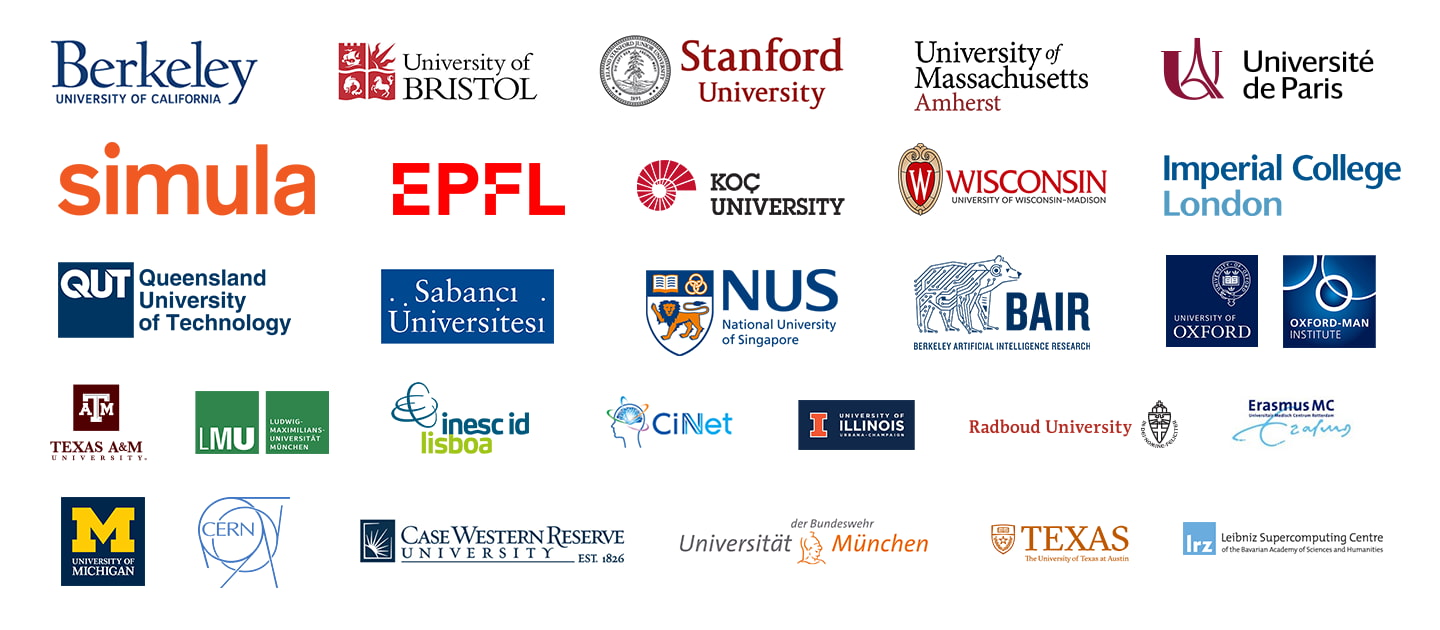Today’s scientific researchers are transforming how academia works with data. As AI techniques are increasingly applied to data simulation and processing, HPC users are looking at ways to use AI and machine learning alongside traditional HPC models. This applies to many different fields of scientific study, ranging from weather forecasting to particle physics. Machine learning algorithms such as graph neural networks (GNNs) or sparse models offer compelling efficiencies for modern research applications, solving existing scientific problems in new and different ways.
This direction of travel within the research community requires a completely new type of compute.
In January, we launched our Academic Programme to enable researchers worldwide to benefit from working with our IPU hardware, which was designed from the ground up to efficiently run AI algorithms. Since then, we’ve successfully grown the programme from 4 participating research organisations to over 25 universities and institutions across the globe based in North America, Asia, Australia and Europe.
Today, with the launch of our new Academic Community channel on Slack, we’re enhancing support for researchers working with IPUs under our Academic Programme. This new Slack community will help cultivate conversations on research discoveries and facilitate new collaborations between participating universities and research institutions.
We are also extending the programme to accept new member applications – researchers based anywhere in the world can read about the programme benefits and apply here.
Research Highlights from our Academic Community
Given the success of the programme so far, we’d like to share just a few examples of the incredible research breakthroughs Graphcore’s academic community has achieved this year.
A research team from the Stanford University School of Medicine helped advance the application potential of Differential Privacy, a machine learning method for securing sensitive data. The Stanford researchers accelerated AI training with Differential Privacy by over 10 times with IPUs, transforming a technique long viewed as too computationally intensive into a viable approach for use cases in healthcare and beyond.
The Oxford-Man Institute of Quantitative Finance‘s innovative multi-horizon forecasting models enabled higher accuracy and longer-term predictions for financial applications such as algorithmic trading, with at least 10 times faster training on IPUs. Their research also demonstrated that IPUs open up opportunities in online learning and reinforcement learning, both very important solutions to help large-scale production models improve over time.
Under the European SparCity project, Graphcore is working with Koç University (Turkey), Sabanci University (Turkey), Simula Research Laboratory (Norway), the INESC-ID research institute (Portugal), and the Munich Network Management Team (Germany) consisting of researchers from Ludwig-Maximilians-Universität München, Leibniz Supercomputing Centre and the University of German Federal Armed Forces. SparCity will create a supercomputing framework to harness the efficiency of sparse computation for next generation AI use cases.
The NSF-funded Accelerating Computing for Emerging Sciences (ACES) Supercomputer project will give researchers in the USA access to IPU hardware to accelerate their discoveries in areas such as genomics, quantum computing and climate modelling. Researchers from Texas A&M University, the University of Illinois at Urbana-Champaign and the University of Texas at Austin are leading the project.
Further important findings from our academic community include:
Visit our research papers portal to read all of the IPU-based academic research. In addition to these research publications, members of our academic community have been creating programming resources and guides for the open source community, an example being the University of Bristol’s HPC cookbook for IPU.
Growing our Academic Programme
Inspired by our academic community’s breakthroughs since the programme’s launch just nine months ago, we will be expanding the scheme significantly over 2022. We hope that this will help even more innovators to take advantage of IPU architectural benefits and accelerate their research.
Since the early days of the Academic Programme, we’ve also introduced free access to the latest IPU hardware, enabling participants to harness our most powerful processor technology and our newest Poplar SDK.
Programme members also benefit from support and regular check-ins from Graphcore researchers and engineers, assistance with support letters for grant and funding proposals and access to all our latest software tools.
From today, every member of our academic programme is also invited to access our new Graphcore Community slack channel. This will help facilitate their important work by giving them greater technical support from our in-house engineers and allowing them to exchange research knowledge with other members of the Graphcore academic community.
Universities can opt to request a guest lecture from us to help students learn about Graphcore’s IPU hardware and software, the latest machine learning algorithms, models and trends, and Graphcore’s Research Directions for machine intelligence. We encourage Professors who are interested in developing and teaching IPU coursework to get in touch with our team.
Apply here to join our Academic Programme
